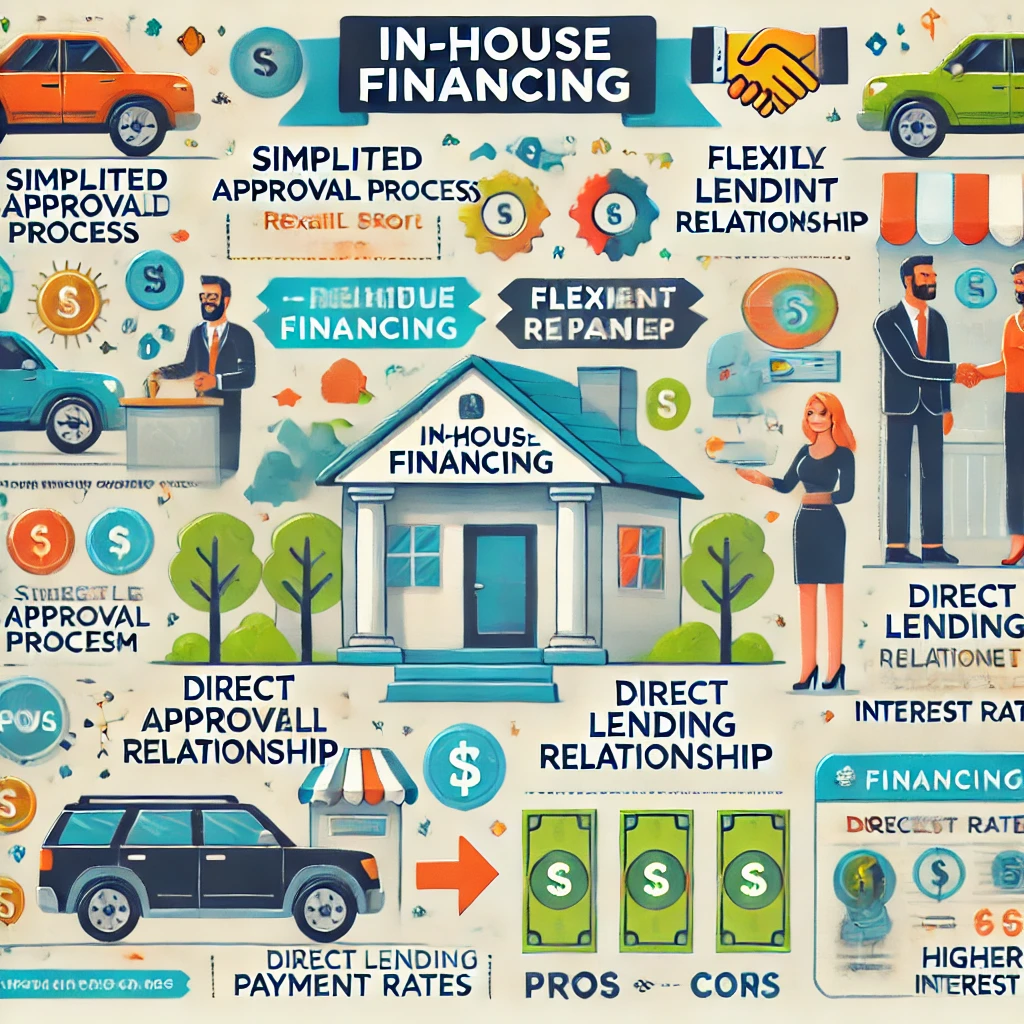What is In House Financing? | When making big purchases, such as buying a car, a home, or even high-end appliances, financing plays a crucial role. But what exactly is in-house financing, and how does it differ from traditional loans? Let’s break it down in simple terms. Learn more about in-house financing What is In House Financing?

Table of Contents
How In-House Financing Works
What is In House Financing? | In-house financing is when a business directly offers loans to customers rather than relying on third-party financial institutions like banks or credit unions. This means the business itself acts as the lender. For instance, a car dealership might provide financing to a customer, bypassing banks altogether. The main features of in-house financing include:
- Direct Lending: The company handles both the sale and the loan.
- Simplified Approval Process: Businesses often have fewer eligibility requirements.
Benefits of In-House Financing
Flexible Qualification Requirements
What is In House Financing? | One of the biggest perks of in-house financing is its accessibility. Traditional lenders often require strong credit scores and extensive documentation. With in-house financing, companies tend to focus less on credit scores, making it an excellent option for those with poor or no credit history.
Faster Approval Process
Unlike traditional financing, which can take days or even weeks for approval, in-house financing is typically quicker. Decisions are often made in-house (pun intended!), speeding up the process.
Direct Relationship with the Lender
When dealing directly with the business offering the loan, it’s easier to negotiate terms and resolve any issues that might arise during the repayment period.
Tailored Payment Plans
In-house financing providers often offer payment schedules tailored to suit different budgets. Whether you’re looking for low monthly payments or a shorter repayment period, they’re usually willing to accommodate your needs.
Accessibility for Low Credit Scores
If your credit score has seen better days, in-house financing can be a lifesaver. It gives you the chance to make a big purchase without the fear of rejection. Additionally, consistent payments on an in-house loan can help improve your credit over time.
Drawbacks of In-House Financing
Higher Interest Rates
The convenience of in-house financing often comes at a price. Interest rates are generally higher compared to traditional loans. This compensates the business for the increased risk of lending to individuals with lower credit scores.
Limited Availability of Deals
While traditional lenders may offer promotional rates or discounts, in-house financing options can be more rigid. This might limit your ability to save money in the long run.
Potential Risk of Overextension
Since qualification requirements are often relaxed, some buyers may find themselves agreeing to terms they cannot realistically afford. This can lead to financial stress or even defaulting on the loan.
Industries Offering In-House Financing
Automotive Sector
Car dealerships frequently offer in-house financing to make vehicles more accessible. It’s a popular choice for buyers who may not qualify for a bank loan.
Retail and Furniture Stores
Large retailers and furniture companies often provide financing options to customers looking to furnish their homes without upfront payments.
Real Estate and Home Builders
Home builders sometimes offer in-house financing to buyers, allowing them to secure their dream home without navigating the complexities of bank loans.
Examples of Companies Providing In-House Financing
Several businesses stand out for their in-house financing programs:
- CarMax in the automotive sector
- Ashley Furniture for home furnishings
- Lennar for real estate purchases
These companies attract customers by offering flexible terms and quicker approvals.
Who Should Consider In-House Financing?
In-house financing works best for:
- Individuals with poor or no credit history
- Buyers looking for a quick and straightforward approval process
However, if you have a strong credit score and can qualify for a traditional loan with better rates, in-house financing may not be your best option.
Steps to Secure In-House Financing
Researching the Right Provider
Start by identifying businesses that offer in-house financing. Read reviews and compare their terms.
Preparing the Necessary Documentation
Though the requirements are lenient, you’ll still need basic documents like proof of income, identification, and address.
Negotiating Terms and Conditions
Don’t be afraid to ask for better terms. Businesses are often willing to adjust repayment schedules or lower interest rates if you negotiate effectively.
Comparing In-House Financing and Third-Party Loans
What is In House Financing? | While in-house financing is convenient, it’s essential to weigh it against third-party loans. Traditional loans often offer better interest rates, while in-house financing provides flexibility and speed.
FAQs About In-House Financing
What Are the Common Requirements?
Requirements typically include proof of income, a valid ID, and a small down payment.
How Does It Impact Your Credit Score?
Timely payments can boost your credit score, but missed payments can have the opposite effect.
Conclusion
What is In House Financing? | In-house financing can be a game-changer for individuals seeking quick and flexible payment options. However, it’s crucial to weigh the benefits against the drawbacks, like higher interest rates. Whether you’re buying a car, furniture, or even a home, in-house financing offers a convenient alternative to traditional loans. Make sure to research, negotiate, and choose the option that best suits your financial situation What is In House Financing?
FAQ‘s
What is the difference between in-house financing and traditional loans?
In-house financing is directly provided by the seller, while traditional loans involve third-party lenders”What is In House Financing?”
Are there risks involved with in-house financing?
Yes, risks include higher interest rates and the possibility of overextending your budget”What is In House Financing?”
Can in-house financing improve my credit score?
Yes, consistent payments can help improve your credit”What is In House Financing?”
Is in-house financing a good option for first-time buyers?
It can be, especially for those with limited credit history”What is In House Financing?”
What industries commonly offer in-house financing?
Automotive, retail, and real estate industries frequently provide in-house financing “What is In House Financing?”





